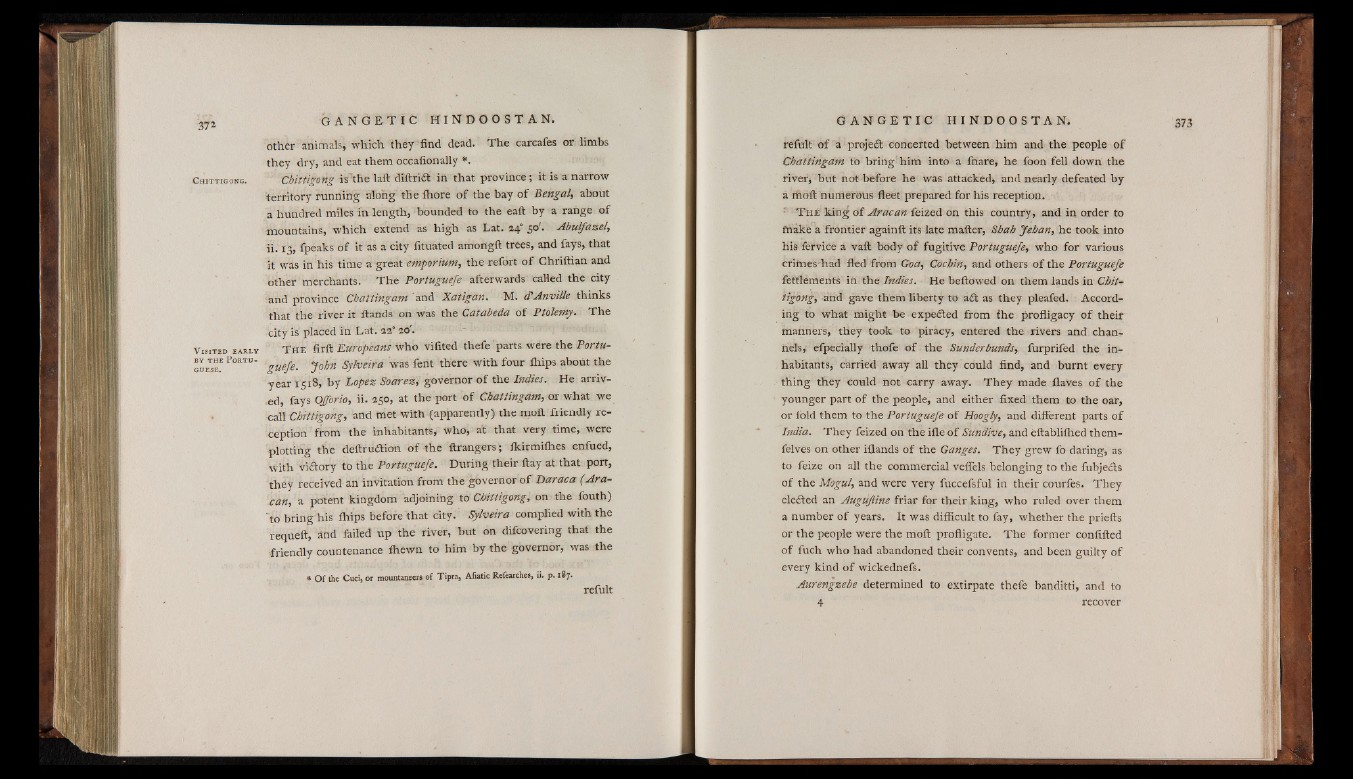
C h i t t i g o n g .
V i s i t e d e a r l y
b y t h e P o r t u g
u e s e .
other animals; which they'find dead. The carcafes or limbs
they dry, and eat them occafionally *.
Chittigong is the laft diftriCt in that province; it is a narrow
territory running along the ihore o f the bay of Bengal, about
a hundred miles in length, hounded to the eaft by a range of
mountains, which extend as high as Lat. 24“ 50'. Abulfazel,
ii. 13, fpeaks of it as a city fituated amongft trees, and fays, that
it was in his time a great emporium, the refort of Chriftian and
other merchants. The Portuguefe afterwards caHed the city
and province Chattingam and Xatigan. M. d'Anville thinks
that the river it itands on was the Catabeda of Ptolemy• The
city is placed in Lat. 22° 20'.
THE firft Europeans who viftted thefe parts were the Portuguefe.
John Sylveira was fent there with four ihips about the
year 1518, by Lopez Soarezi governor o f the Indies. He arrived,
fays OJorio, ii. 230, at the port of Chattingam, or what we
call Chittigong, and met with (apparently) the moft friendly reception
from the inhabitants, who, at that very time, were
plotting the deftruCtion o f the ftrangers; fkirmiihes enfued,
with vi'Clory to the Portuguefe. During their ftay at that port,
they received an invitation from the governor o f Daraca (Ara-
can, a potent kingdom adjoining to Chittigong, on the fouth)
to bring his ihips before that city. Sylveira complied with the
requeft, and failed up the river, but on difcovering that the
friendly countenance fhewn to him by the governor, was the
* Of the Cuci, or mountaneers of Tipra, Afiatic Refearches, ii. p, 187.
refult
refult of a project concerted between him and the people of
Chattingam to bring him into a fnare, he foon fell down the
river, but not-before he was attacked, and nearly defeated by
a ittoft numerous fleet prepared for his reception.
: ThE king of Aracan feized on this country, and in order to
fnàke a frontier againft its late matter, Shah Jeban, he took into
his fervice a vaft body of fugitive Portuguefe, who for various
critneshad fled from Goa, Cochin, and others o f the Portuguefe
fettléments in the Indies. He beftowed on them lands in Chit-
iigong, and gave them liberty to aCt as they pleafed. According
to what might be expeCted from fhe profligacy o f their
manners, they took to piracy, entered the rivers and channels,
efpecially thofe of the Sunder bunds, furprifed the inhabitants,
carried away all they could find, and burnt every
thing they could not carry away. They made flaves o f the
younger part o f the people, and either fixed them to the oar,
or fold them to the Portuguefe of Hoogly, and different parts of
India. They feized on the ifle o f Sundive, and eftabliihed them-
felves on other iflands o f the Ganges. They grew fo daring, as
to feize on all the commercial veffels belonging to the fubjedts
of the Mogul, and were very fuccefsful in their conrfes. They
eleded an Augujiine friar for their king, who ruled over them
a number o f years. It was difficult to fay, whether the priefts
or the people were the moft profligate. The former confifted
of fuch who had abandoned their convents, and been guilty of
every kind of wickednefs.
Aurengzebe determined to extirpate thefe banditti, and to
4 recover